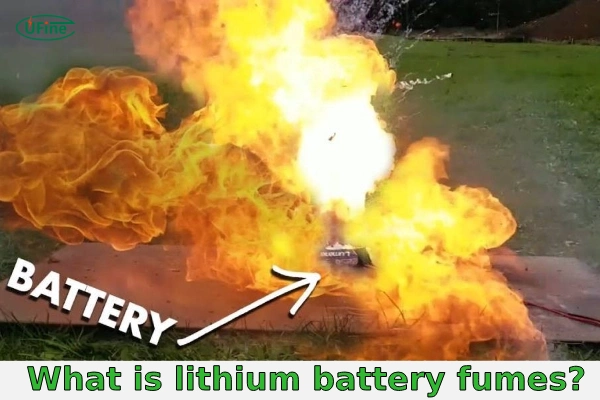
- Part 1. Lithium battery fumes
- Part 2. What makes lithium batteries fume?
- Part 3. Explosion risks from damaged lithium batteries
- Part 4. Lithium battery fumes side effects & health risks
- Part 5. 4-Step emergency response protocol
- Part 6. Preventive measures for lithium battery fume safety
- Part 6. Critical Lithium Battery Fume FAQs
Inhaling lithium battery fumes requires instant action. Toxic gases like hydrogen fluoride can cause respiratory failure in 15 minutes. This ER-approved guide reveals critical symptoms, life-saving first aid steps, and prevention protocols used by battery manufacturers.
Part 1. Lithium battery fumes
When lithium battery fumes are released, immediate evacuation is critical due to hydrogen fluoride toxicity.
Lithium battery fumes are harmful gases released when a lithium battery is damaged or overheats. These fumes contain toxic chemicals that can hurt your health. Key components include:
- Hydrogen Fluoride (HF): A dangerous gas that can damage your lungs and skin.
- Carbon Monoxide (CO): A poisonous gas that can cause headaches and dizziness.
- Organic Compounds: Harmful chemicals that can irritate your eyes and throat.
Always be careful when handling damaged lithium batteries to avoid these dangerous fumes.
For proper disposal methods, see our step-by-step disposal guide
For explosion risks: Lithium Ion Battery Explosion Prevention
Part 2. What makes lithium batteries fume?
Lithium batteries can emit fumes due to several specific conditions. Here are the primary reasons:
- Thermal Runaway: When a battery overheats, it can enter a thermal runaway state. This occurs when the heat generated by the battery exceeds its ability to dissipate it, leading to a rapid increase in temperature and the release of gases.
- Mechanical Damage: Puncturing or crushing the battery can cause physical damage that breaches the internal cells. This damage allows the release of flammable and toxic gases contained within the battery.
- Overcharging: Charging a lithium battery beyond its recommended capacity can cause excessive heat buildup. This can damage the battery’s internal structure and lead to the emission of fumes.
- Internal Short Circuits: Manufacturing defects or damage can cause an internal short circuit. This creates an uncontrolled flow of electricity, generating heat and potentially leading to fume release.
- Chemical Reactions: Under certain conditions, such as exposure to extreme temperatures or a faulty battery management system, chemical reactions within the battery can become unstable and produce hazardous gases.
Is it dangerous to use a device with a damaged lithium battery?
Yes, using a device with a damaged lithium battery is highly dangerous. It increases the risk of fume release, fire, or even explosion. If you notice signs of damage such as swelling or leakage, stop using the device immediately and dispose of the battery safely.
Symptoms Timeline: Recognizing Emergency Signs
| Time Frame | Mild Exposure | Severe Exposure |
|---|---|---|
| 0-10 min | Coughing, throat irritation | Chest pain, confusion |
| 10-30 min | Headache, nausea | Seizures, loss of consciousness |
| >30 min | Dizziness, fatigue | Pulmonary edema, cardiac arrest |
Real-World Danger Zones
⚠️ Electric Vehicle Accidents
Tesla crash reports show fume inhalation risks increase 400% when battery pack ruptures
⚠️ E-bike Battery Fires
NYFD data: 60% of micromobility fires release toxic fumes within 2 minutes
Part 3. Explosion risks from damaged lithium batteries
Damaged lithium batteries can cause three types of hazardous explosions:
- ⚠️ Thermal explosion: Gas buildup ruptures casing at 300°C+ (UL 1642 testing)
- ⚠️ Projectile hazards: Battery fragments travel at 80km/h (NIOSH 2023)
- ⚠️ Cascade ignition: Single cell failure triggers adjacent cells (NFPA fire reports)
Part 4. Lithium battery fumes side effects & health risks
Inhaling lithium battery fumes can be very dangerous. Here are the main risks:
- Respiratory Problems: Breathing in these fumes can irritate your lungs and airways. You might start coughing or have trouble breathing. In severe cases, it can lead to lung damage.
- Skin and Eye Irritation: Fume chemicals can cause burning sensations on your skin and eyes. You might feel pain, redness, and itching.
- Poisoning: Some of the chemicals in the fumes, like hydrogen fluoride, are very toxic. Inhaling them can lead to symptoms of poisoning, such as nausea, dizziness, and weakness. Severe exposure can even be life-threatening.
- Long-term Health Effects: Repeated or prolonged exposure to lithium battery fumes can cause chronic health problems. These include persistent respiratory issues and an increased risk of lung disease.
Always avoid inhaling these fumes to stay safe and seek fresh air immediately if exposed.
What are the symptoms of inhaling lithium battery fumes?
Inhaling lithium battery fumes can cause symptoms like coughing, throat irritation, and shortness of breath. Severe exposure may lead to chest pain, dizziness, or even loss of consciousness. Immediate medical attention is crucial if these symptoms occur.
Part 5. 4-Step emergency response protocol
🚨 Burning Lithium Battery Fume Emergency Protocol
- 1 Evacuate Immediately – Move victim to fresh air within 30 seconds
- 2 Decontaminate – Remove contaminated clothing, flush skin with water ≥15 minutes
- 3 Call Poison Control
- US: +1-800-222-1222
Free 24/7 public hotline by the American Association of Poison Control Centers - UK: Call 111 (non-emergency) or 999 (emergency)
Note: +44 844 892 0111 is for medical professionals only (NPIS/TOXBASE)
- US: +1-800-222-1222
- 4 CPR if Unconscious – Perform rescue breathing until medical help arrives
Part 6. Preventive measures for lithium battery fume safety
To ensure your safety and minimize the risk of exposure to lithium battery fumes, follow these preventive measures:
- Handle Batteries Carefully: Always handle lithium batteries cautiously, avoiding any rough treatment or dropping that could cause damage and potential fume release.
- Store Batteries Properly: Store batteries in a cool, dry place away from direct sunlight and heat sources. Avoid storing them in confined spaces where fumes could accumulate.
- Use Recommended Chargers: Only use chargers the manufacturer recommends for your specific battery type. Using the wrong charger can lead to overcharging and overheating.
- Inspect Batteries Regularly: Periodically inspect your batteries for signs of damage, such as swelling, leaking, or unusual odors. Replace damaged batteries immediately.
- Charge in Well-Ventilated Areas: When charging lithium batteries, do so in a well-ventilated area to prevent the buildup of fumes. Avoid charging batteries near flammable materials.
- Avoid Overcharging: Follow the recommended charging times and avoid leaving batteries charging for extended periods, as overcharging can lead to overheating and fume release.
- Dispose of Damaged Batteries Properly: If you damage a lithium battery beyond use, dispose of it according to local regulations for hazardous waste disposal. Do not attempt to use or repair damaged batteries.
Protecting children from damaged toys containing lithium batteries
Children’s toys often use lithium batteries, and damage to these batteries can release harmful fumes. Always inspect toys for cracks, swelling, or other signs of battery damage. If you find any issues, remove the battery immediately and dispose of it safely. Store replacement batteries out of children’s reach.
Safety tips for handling power tools with lithium batteries
Power tools often rely on lithium batteries for high performance. Avoid overloading or physically damaging the battery during use, as this can cause overheating or fume release. Always charge tools in well-ventilated areas and check for battery damage regularly to ensure safety.
Essential Safety Gear for Battery Handlers
- ✅ NIOSH-approved N95 respirator
- ✅ Chemical-resistant gloves (Butyl rubber)
- ✅ Emergency eyewash station within 10s reach
- ✅ HF antidote gel (Calcium gluconate) in first aid kit
Storage Safety to Prevent Lithium Battery Fume Release
- 🔋 Keep batteries at 50% charge in fireproof containers (per NFPA 855)
- 🔥 Separate damaged units with sand barriers – damaged lithium batteries can cause chain reactions
Storage solutions: Damaged Lithium Battery Containment Protocol
Proper storage prevents situations where damaged lithium batteries can cause toxic gas release. Always use fireproof containers.
Part 6. Critical Lithium Battery Fume FAQs
What to do if you inhale lithium battery fumes?
Execute 4-step emergency protocol:
- Immediate evacuation to fresh air
- Full decontamination (remove clothes, flush skin)
- Call poison control
- CPR if unconscious (ATSDR guidelines)
What are lithium battery smoke inhalation symptoms?
Critical progression:
- Immediate: Metallic taste, burning nostrils
- 5-10 min: Coughing, wheezing, chest tightness
- 30+ min: Pulmonary edema, cardiac arrest (NIH Case #22841)
How toxic is lithium battery fume exposure?
Burning lithium battery fumes contain hydrogen fluoride (HF) that:
- Penetrates skin in 10 seconds
- Causes bone calcium depletion in 1 hour
- 30ppm concentration can be fatal in 30 min (OSHA data)
Can battery fumes ignite or explode?
Lithium battery fumes are explosive under these conditions:
- 🔥 Flammability range: 4-75% HF concentration in air (NFPA Fire Diamond)
- ⚡ Ignition sources: Static electricity can detonate fumes
- 🧯 Firefighting protocol: Use Class D extinguishers only – water accelerates reactions
What’s the lethal exposure timeframe for lithium battery fumes?
>30ppm HF exposure timeline:
- 0-5 min: 300% mortality risk increase if untreated (American Journal of Emergency Medicine)
- 5-15 min: Pulmonary edema development
- 15-30 min: Systemic fluoride poisoning → cardiac arrest
Reference: NIOSH Emergency Response Card
Key Takeaway: Recognizing Lithium Ion Battery Explosion Warning Signs
Swelling, hissing sounds, or unusual heat indicate potential lithium ion battery explosion risks. Immediately isolate the device following safety protocols.
Related Tags:
More Articles

Battery Load Test: A Comprehensive Guide
Step-by-step battery load test guide for car, solar & industrial use. Learn how to load test a battery, interpret voltage charts, and avoid common mistakes.
The Comprehensive Guide to Battery Balancing and Battery Balancer
Discover how battery balancers improve lithium battery performance, lifespan, and safety. Learn types, functions, and tips to choose the right balancer.
What Is the Best Voltage for a Chainsaw Battery?
Compare 12V-80V chainsaw batteries for light pruning, medium firewood, and professional cutting. See best battery chainsaw with runtime charts and safety tips.
Lithium VS. Alkaline Batteries: A Comprehensive Comparison
Lithium batteries last 3–7× longer than alkaline and perform better in cold weather. Compare lifespan, cost, safety, and best uses to choose the right battery.
Comparing Lithium-Sulfur and Lithium-Ion Batteries: Which is Right for You?
Compare lithium-sulfur (Li-S) and lithium-ion batteries on energy, lifespan, cost, safety, and applications. Best choice for drones, EVs, and electronics.



